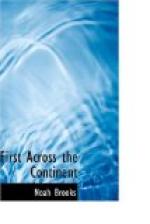The rain that now deluged the unhappy campers was so incessant that they might well have thought that people should be web-footed to live in such a watery region. In these later days, Oregon is sometimes known as “The Web-foot State.” Captain Clark, in his diary, November 28, makes this entry: “O! how disagreeable is our situation dureing this dreadfull weather!” The gallant captain’s spelling was sometimes queer. Under that date he adds:—
“We remained during the day in a situation the most cheerless and uncomfortable. On this little neck of land we are exposed, with a miserable covering which does not deserve the name of a shelter, to the violence of the winds; all our bedding and stores, as well as our bodies, are completely wet; our clothes are rotting with constant exposure, and we have no food except the dried fish brought from the falls, to which we are again reduced. The hunters all returned hungry and drenched with rain, having seen neither deer nor elk, and the swan and brant were too shy to be approached. At noon the wind shifted to the northwest, and blew with such tremendous fury that many trees were blown down near us. This gale lasted with short intervals during the whole night.”
Of course, in the midst of such violent storms, it was impossible to get game, and the men were obliged to resort once more to a diet of dried fish, This food caused much sickness in the camp, and it became imperatively necessary that efforts should again be made to find game. On the second of December, to their great joy an elk was killed, and next day they had a feast. The journal says;
“The wind was from the east and the morning fair; but, as if one whole day of fine weather were not permitted, toward night it began to rain. Even this transient glimpse of sunshine revived the spirits of the party, who were still more pleased when the elk killed yesterday was brought into camp. This was the first elk we had killed on the west side of the Rocky Mountains, and condemned as we have been to the dried fish, it formed a most nourishing food. After eating the marrow of the shank-bones, the squaw chopped them fine, and by boiling extracted a pint of grease, superior to the tallow itself of the animal. A canoe of eight Indians, who were carrying down wappatoo-roots to trade with the Clatsops, stopped at our camp; we bought a few roots for small fish-hooks, and they then left us. Accustomed as we were to the sight, we could not but view with admiration the wonderful dexterity with which they guide their canoes over the most boisterous seas; for though the waves were so high that before they had gone half a mile the canoe was several times out of sight, they proceeded with the greatest calmness and security. Two of the hunters who set out yesterday had lost their way, and did not return till this evening. They had seen in their ramble great signs of elk and had killed six, which they had butchered and left at a great distance. A party was sent in the morning.”




